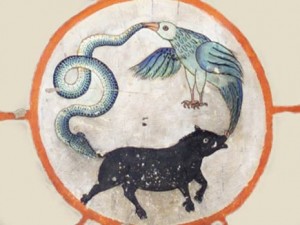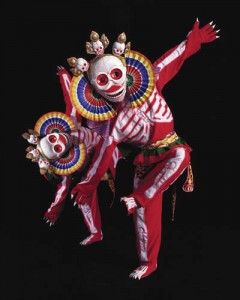An excerpt from a teaching by Jetsunma Ahkon Norbu Lhamo on October 18, 1995
We have made many offerings to the Guru. Mostly what we have offered the Guru are five cups: five cups of poison. We have offered the Guru hatred, because there in the presence of the primordial nature, there in the presence of the display of the Bodhicitta, there in that non-dual pristine purity, we have shamelessly hated, abused, and neglected. We have committed horrible sins against others who are innocent — against motherly sentient beings — not only in this lifetime, but previously as well. And we have done this bold-faced in the presence of that which is so holy as to be indescribable.
We have offered the cup of greed and grasping. Every single day in the presence of our own mind, the face of the Guru, in the great silent sound of primordial emptiness, there in the great quiet light of the display of luminosity, right there in the place of Bodhicitta, from our mouth, we have offered the cup of greed instead of the speech of comfort. This is what we have offered to the Guru. This is the offering that we have made. Without shame we grasp. We are filled with greed. We do nothing but think about me, me, me, and “What I can have?” and “What I can do?” and “How great I am!” and “Don’t you want to give me some more approval?” “Don’t you want to give me some more?” This is what we do in the face of the Guru.
And then the third cup that we offer to the face of the Guru is our ignorance. Not only do we begin with ignorance — which is forgivable, in the sense that we are born; we wake up; at five or six years old we come to consciousness. Later on, we figure out that we’re as dumb as posts. We just don’t know. We are ignorant. We don’t have the teaching yet. But now we have come to the point where we have received the teaching. We have received enough of the teaching where you could say that while we still abide in samsara, we are moving away from ignorance. We are bringing down, or quelling, the poison of ignorance. Yet, in the face of the Guru, in the face of the primordial empty nature that is our nature, in the face of the very display of Bodhicitta, we have willfully remained ignorant. Willfully. We have not accomplished our practice. We have turned away from our practice. We have not tried very hard. We have not listened to the teachings. We have not taken the advice of our Gurus. We continue to listen to the teaching as though it was water rolling off of our back
Imagine that you had one chance to listen to Guru Rinpoche and that was the only contact with Dharma that you were ever going to have in your whole life, and Guru Rinpoche offered to give you the keys to liberation, everything that you need. What would that listening look like? Hopefully, if you are not dumber than a post, you would listen to the Guru as though it were your very breath. You would listen with your whole heart and every word would be like food, like nectar to you. You would take every bit of it home and work with it all the time. If that were the only opportunity you would ever receive and you were receiving these teachings from Guru Rinpoche, maybe you might think like that.
But in the face of our root Guru that’s not what we do. We report dutifully for class and we hear the teachings. I used to walk around and ask students, “What was the teaching about that I taught the other night?” But I stopped that because that used to break my heart, when there was no answer.
We are faulted in the way that we make offerings. We cling to our ignorance. We have heard the method, we have heard the teachings, and yet we do not practice accordingly, to the best of our abilities. And so, we have offered the cup of ignorance to our Guru. And that has been the best that we could do.
The next cup that we have offered to the Guru is jealousy. Bold faced, in the face of our very nature, in the very display of Bodhicitta we have looked at the accomplishments of others, and we have said, I can do that. We have competed and we have been jealous. We have looked to other’s belongings and we have said, “I wish I had that instead of you.” We try to make ourselves feel better, to practice self-aggrandizement, by lifting ourselves up and putting others down. These things we have done in the very face of the Guru who is indistinguishable from us and from our nature, and indistinguishable from the nature of all beings. There is only nature. It is not divided into pigeon holes. Its not like an ice-cube tray where its all divided into sections. So when we look into the face of any other sentient being, any motherly sentient being, and perform our usual ritual of jealousy and competitiveness, then this is the game that we are actually playing with the root Guru. We have, therefore in truth, been jealous and competitive toward the root Guru, because there is no distinction. And if we think that it’s okay to be that way in front of other sentient beings but not okay to be that way in front of the Guru, then we are holding up the cup of ignorance as well. By now we should know better than that. We have been taught more than that. By now we know that all sentient beings have within them the Buddha nature, the Buddha seed, and that is inseparable from the Guru’s nature. So, if we harm, or ignore, or treat badly or abuse others, this is what we have done to the Guru. We have held up the cup of jealousy.
And the last wonderful offering that we have made to the Guru is the cup of pride. In front of the Guru, that nature which is all-pervasive, fundamentally undifferentiated, free of any kind of conjecture, or contrivance, or distinction; in front of that pure display, we have held ourselves up as great, special and superior. We have held ourselves up as that which requires special attention. We have held ourselves up as that which requires approval because we are so wonderful. And we have not been ashamed, in front of the face of the Guru, to indicate that we are superior to others. We have not been ashamed to do that. Strangely, we feel shame and embarrassment at the idea of surrender in devotion, but we have no shame about showing our stinking nasty pride in front of the face of the Guru. That doesn’t bother us at all. Our thinking is completely backwards.
Now, this is not good news. We like hear good inspiring things. We like to be entertained. This is not the kind of thing that we like to hear. But you know, if you really are honest with yourself, if you really examine yourself, you know that what I am saying is true.
© Jetsunma Ahkön Lhamo


